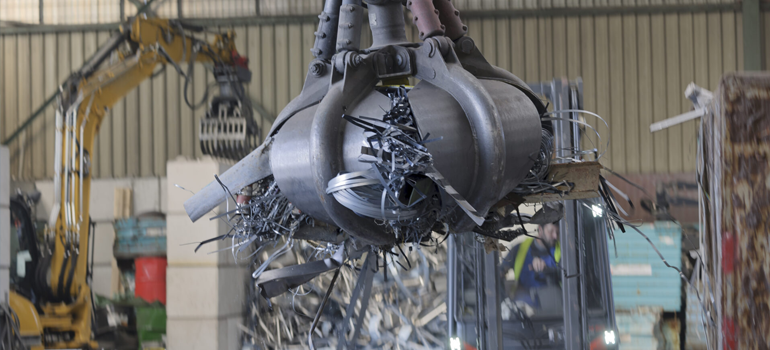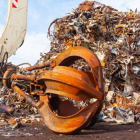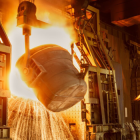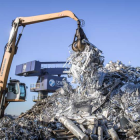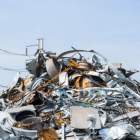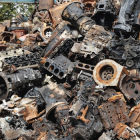Recycling scrap metal is an essential part of the global economy. It not only helps in conserving natural resources but also reduces energy consumption and lowers greenhouse gas emissions. Among the various metals used in industries worldwide, there are certain metals that are consistently in high demand for recycling. These metals are valuable, versatile, and have applications in numerous industries, making them sought-after for scrap recycling.
In this blog, we will explore the top 5 metals that are always in demand for scrap recycling, their uses, and why they are so highly valued.
1. Copper
Why Copper is in Demand: Copper is one of the most valuable metals in the recycling industry. It is highly sought after because of its excellent electrical and thermal conductivity, corrosion resistance, and durability. Copper is widely used in electrical wiring, plumbing, electronics, and renewable energy industries, which makes it a high-demand metal for recycling.
Uses:
* Electrical wiring and cables
* Plumbing pipes and fittings
* Electrical components in computers, phones, and other electronic devices
* Industrial machinery and equipment
* Renewable energy systems (solar panels, wind turbines)
Why It’s Valuable in Recycling: Recycling copper is highly efficient as it maintains its quality and doesn’t lose any of its properties during the recycling process. It also saves significant amounts of energy compared to extracting new copper from ores, making it environmentally and economically advantageous.
2. Aluminum
Why Aluminum is in Demand: Aluminum is one of the most common metals in everyday life, found in products such as cans, foils, windows, and cars. The recycling of aluminum is crucial due to its lightweight nature, strength, and resistance to corrosion. The demand for aluminum scrap recycling remains high due to the metal’s widespread use and the fact that it can be recycled indefinitely without losing its quality.
Uses:
* Beverage cans
* Automotive parts and components
* Aircraft parts
* Building materials (windows, doors, roofing)
* Packaging materials (foil, containers)
Why It’s Valuable in Recycling: Recycling aluminum saves up to 95% of the energy required to produce new aluminum from raw bauxite. This makes it a highly efficient metal for recycling. The recycling process also reduces the environmental impact associated with aluminum production, making it a sustainable choice for many industries.
3. Steel
Why Steel is in Demand: Steel is an alloy made primarily of iron and carbon and is one of the most commonly used metals in the world. It is widely utilized in construction, manufacturing, transportation, and various industrial sectors. Scrap steel is always in demand because it is abundant, easy to recycle, and can be reused to create new steel products without compromising its strength.
Uses:
* Construction (steel beams, rebar)
* Automotive industry (car bodies, parts)
* Household appliances (washing machines, refrigerators)
* Industrial machinery and equipment
* Infrastructure (bridges, roads)
Why It’s Valuable in Recycling: Steel is one of the most recycled materials globally, as it can be melted down and reused to produce new steel products. The recycling of steel requires less energy than producing new steel from iron ore and is more cost-effective, contributing to its continued demand in scrap recycling markets.
4. Lead
Why Lead is in Demand: Lead is a soft, malleable metal with high density and resistance to corrosion. Although lead is toxic in large amounts, it is still heavily used in batteries (particularly in lead-acid batteries), shielding for radiation protection, and some construction materials. Lead recycling is essential because of the metal’s toxicity and the increasing demand for its use in lead-acid batteries, which are widely used in vehicles and backup power systems.
Uses:
* Lead-acid batteries (automotive, backup power)
* Shielding for radiation (X-ray equipment, medical devices)
* Roofing and construction materials
* Solder in electronics
Why It’s Valuable in Recycling: Lead is one of the most recycled metals, with nearly all lead-acid batteries being recycled for their lead content. The recycling process is highly efficient, and the metal can be reused multiple times without losing quality. Recycling lead also helps in reducing environmental hazards associated with lead waste.
5. Nickel
Why Nickel is in Demand: Nickel is a versatile metal that is primarily used in the production of stainless steel, alloys, and batteries. Due to its resistance to corrosion and heat, nickel is widely used in aerospace, automotive, and industrial applications. The rising demand for electric vehicles (EVs), which use nickel-based batteries, has further increased the need for nickel recycling.
Uses:
* Stainless steel production
* Electric vehicle batteries (Nickel-Metal Hydride, Lithium-Ion)
* Aerospace and marine components
* Electronics (batteries, connectors)
Why It’s Valuable in Recycling: Nickel is a high-value metal due to its application in stainless steel and energy storage systems. Recycling nickel saves a considerable amount of energy compared to extracting it from ore, and the metal is in demand for its use in electric vehicle batteries and other modern technologies. Nickel is also often recycled in the form of scrap stainless steel, further boosting its demand.
Conclusion
Recycling scrap metal plays a critical role in the global economy, and the five metals—copper, aluminum, steel, lead, and nickel—are consistently in demand due to their widespread use across various industries. The recycling of these metals not only conserves natural resources but also contributes to energy savings, reduces waste, and lowers environmental impact.
As industries continue to grow and demand for these metals remains high, the need for efficient scrap metal recycling will only increase. By supporting recycling programs and ensuring the responsible collection of scrap metals, we can help maintain a sustainable and thriving economy for years to come.

